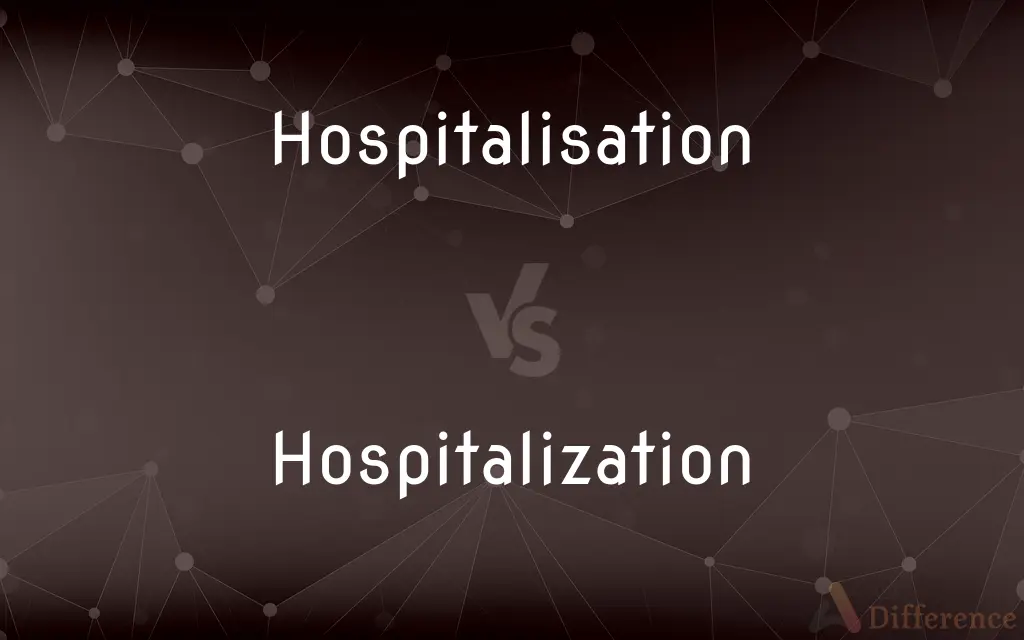Hospitalisation vs. Hospitalization — What's the Difference?
By Fiza Rafique & Urooj Arif — Updated on April 22, 2024
"Hospitalisation" follows British English spelling rules, incorporating an 's', while "Hospitalization" uses American English conventions, opting for a 'z'.

Difference Between Hospitalisation and Hospitalization
Table of Contents
ADVERTISEMENT
Key Differences
The term "hospitalisation" is commonly used in countries that follow British English conventions, emphasizing the 's' in its spelling. On the other hand, "hospitalization" is prevalent in American English, which prefers the use of 'z' in similar contexts.
Both terms refer to the act of admitting someone into a hospital for treatment.In academic and professional writing within the UK, "hospitalisation" is the standard spelling, reflecting broader British spelling patterns that favor 's' over 'z' in words like 'realise' and 'organise'. Conversely, in the United States, "hospitalization" aligns with American spelling rules, which also affect words such as 'realize' and 'organize'.
When publishing internationally or in journals, the choice between "hospitalisation" and "hospitalization" might depend on the publication's style guide. While international audiences may encounter both forms, American publications strictly use "hospitalization".
Spell check settings on computers and word processors can also differ based on the version of English selected. "Hospitalisation" might be flagged as incorrect in an American English setting, whereas "hospitalization" could be marked wrong in British English settings.
The understanding of these terms across different English-speaking populations can impact how they are perceived and used. Both forms are correct but are specific to their respective versions of English, illustrating the diversity within the language.
ADVERTISEMENT
Comparison Chart
Spelling
Hospitalisation
Hospitalization
Pronunciation
/ˌhɒspɪtəlɪˈzeɪʃən/
/ˌhɑːspɪtəlɪˈzeɪʃən/
Common Usage Region
UK, Australia, New Zealand
USA, Canada
Associated Dialect
British English
American English
Lexical Preference
Favours 's'
Favours 'z'
Compare with Definitions
Hospitalisation
The act of admitting someone into a hospital.
After the accident, his hospitalisation was immediate and necessary.
Hospitalization
A measure of how many people are in hospitals.
Hospitalization figures have been rising due to the epidemic.
Hospitalisation
A period spent receiving treatment in a hospital.
Her hospitalisation lasted two weeks.
Hospitalization
The procedure for admitting someone to a hospital.
The hospitalization of patients varies from one state to another.
Hospitalisation
Used in discussions of healthcare policy.
They discussed the costs associated with hospitalisation during the meeting.
Hospitalization
Pertaining to health policy discussions.
Hospitalization costs are a major topic in healthcare reform debates.
Hospitalisation
The process involved in arranging for someone to be admitted to a hospital.
The hospitalisation process can be lengthy and complex.
Hospitalization
A period spent in a hospital for treatment.
Her hospitalization gave her the care she needed.
Hospitalisation
Refers to a statistic measuring the number of people in hospitals.
The flu outbreak led to a rise in hospitalisation rates.
Hospitalization
The act of admitting someone into a hospital.
His hospitalization was required after symptoms worsened.
Hospitalisation
Alternative spelling of hospitalization
Hospitalization
The act of placing a person in a hospital as a patient.
Hospitalisation
Medical care in a hospital; also, the period during which one receives care in a hospital.
Hospitalization
The condition of being hospitalized.
Hospitalisation
Placing in medical care in a hospital
Hospitalization
Insurance that fully or partially covers a patient's hospital expenses.
Hospitalization
The hospitalizing of a patient, the condition of being hospitalized, or the period a patient stays in hospital.
Hospitalization
Insurance that pays a patient's expenses.
Hospitalization
A period of time when you are confined to a hospital;
Now they try to shorten the patient's hospitalization
Hospitalization
The condition of being treated as a patient in a hospital;
He hoped to avoid the expense of hospitalization
Hospitalization
Insurance that pays all or part of a patient's hospital expense
Hospitalization
Placing in medical care in a hospital
Common Curiosities
What other words follow similar spelling variations between British and American English?
Words like "organisation/organization" and "realise/realize" follow similar variations.
Will using "hospitalisation" in an American document affect its formality or correctness?
Using "hospitalisation" in an American context might be viewed as a spelling error and could potentially affect the perceived correctness of the document.
Are there contexts where either spelling would be universally accepted?
In international forums or publications that do not specify American or British English, either spelling might be accepted.
What is the historical reason for the difference in spelling?
The spelling differences stem from early 18th-century English reform efforts that aimed to standardize spelling, which evolved differently in the US and the UK.
How should I choose between "hospitalisation" and "hospitalization" in academic writing?
Choose based on the style guide required by the publication or institution, typically determined by the variant of English they adhere to.
Is there a pronunciation difference between "hospitalisation" and "hospitalization"?
The pronunciation is very similar, though accents may slightly affect the pronunciation of the vowel sounds.
How can I remember which spelling to use?
Remember that "hospitalisation" with 's' is used in regions where British English is prevalent, like the UK and Australia, while "hospitalization" with 'z' is used in American English-speaking countries.
Are there any online tools that help identify the correct spelling between British and American English?
Yes, online dictionaries often specify the variant and spell check tools can be set to either American or British English.
Is there a trend towards one spelling becoming more globally dominant?
No clear trend indicates one form becoming globally dominant, though American English influences can be strong due to the spread of American media.
What impact does globalization have on these spelling differences?
Globalization can blur these distinctions as writers and readers become accustomed to encountering both forms in various media.
Does the use of "hospitalisation" or "hospitalization" vary within English-speaking countries outside the US and UK?
Yes, countries like Canada and Australia might lean towards British English, but global influences can introduce variation.
Are there legal implications to using one spelling over the other in official documents?
Generally, no legal implications exist solely based on spelling differences as long as the intended meaning is clear and appropriate to the context.
What should non-native English speakers know about these variations?
Non-native speakers should be aware of these variations and consider the primary audience or region when choosing spellings in their writing.
How do educational systems in different countries teach these variations?
Educational systems typically teach the version of English most relevant to their geographic or cultural context but may also expose students to alternative forms.
Can software settings be adjusted to accommodate different English spellings?
Yes, most word processing software allows users to select either American or British English, which adjusts the spelling and grammar checks accordingly.
Share Your Discovery

Previous Comparison
Adaptation vs. Arrangement
Next Comparison
Rejoinder vs. RetortAuthor Spotlight
Written by
Fiza RafiqueFiza Rafique is a skilled content writer at AskDifference.com, where she meticulously refines and enhances written pieces. Drawing from her vast editorial expertise, Fiza ensures clarity, accuracy, and precision in every article. Passionate about language, she continually seeks to elevate the quality of content for readers worldwide.
Co-written by
Urooj ArifUrooj is a skilled content writer at Ask Difference, known for her exceptional ability to simplify complex topics into engaging and informative content. With a passion for research and a flair for clear, concise writing, she consistently delivers articles that resonate with our diverse audience.














































